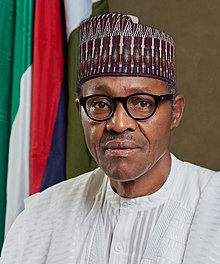This article may document a neologism or protologism in such a manner as to promote it. (January 2021) |

Buharism refers to the socio-political and economic ideology of Muhammadu Buhari, former military head of state and president of Nigeria. Following the 1983 Nigerian coup d'etat which truncated the Second Nigerian Republic, General Muhammadu Buhari became military head of state. He immediately launched an unprecedented military-led social engineering campaign, War Against Indiscipline, with the aim of forcibly promoting civic virtues.
Buharism came to represent a national third force at the height of the Cold War era, favouring neither communism nor capitalism. His economic ideology was solely predicated on the practicalities needed for a Third World nation to develop: mainly economic self-sufficiency, disciplined citizenry, and national development. As the supreme leader and commander of the regime, Buhari significantly derived charismatic authority.
The revisionist 1985 Nigerian coup d'état was the antithesis of Buharism; his Chief of Army Staff and successor General Ibrahim Babangida opposed the heavy-handedness of Buhari's social campaign and the economic dirigisme policies. Babangida later went on to become the longest-serving post-Civil War military head of state; his regime saw a drastic re-alignment towards the rapidly emerging new international order with the introduction of the IMF-sanctioned programmes: privatisation, deregulation, and devaluation.
Imprisoned and subsequently out of power for 30 years, Muhammadu Buhari contested the 2003, 2007, 2011, and later 2015 presidential elections, winning the last one and defeating the incumbent Goodluck Jonathan. Buharism gradually transformed into a cult of personality and initially enjoyed broad support throughout the country, especially in Northern Nigeria, until the 2019 Nigerian presidential election, which caused a significant decline in Buhari's popularity.[1]
- ^ Demarest, Leila. "Why Buhari won even though he had little to show for first term". The Conversation. Retrieved 12 June 2020.
